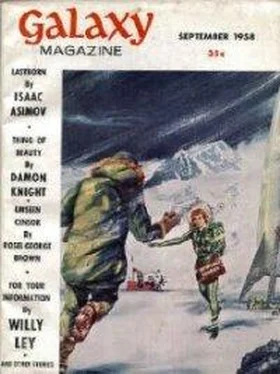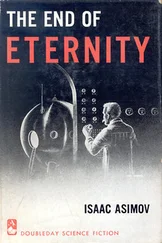Isaac Asimov - The Ugly Little Boy
Здесь есть возможность читать онлайн «Isaac Asimov - The Ugly Little Boy» весь текст электронной книги совершенно бесплатно (целиком полную версию без сокращений). В некоторых случаях можно слушать аудио, скачать через торрент в формате fb2 и присутствует краткое содержание. Год выпуска: 1958, Издательство: Galaxy Publishing Corporation, Жанр: Фантастика и фэнтези, на английском языке. Описание произведения, (предисловие) а так же отзывы посетителей доступны на портале библиотеки ЛибКат.
- Название:The Ugly Little Boy
- Автор:
- Издательство:Galaxy Publishing Corporation
- Жанр:
- Год:1958
- ISBN:нет данных
- Рейтинг книги:4 / 5. Голосов: 1
-
Избранное:Добавить в избранное
- Отзывы:
-
Ваша оценка:
- 80
- 1
- 2
- 3
- 4
- 5
The Ugly Little Boy: краткое содержание, описание и аннотация
Предлагаем к чтению аннотацию, описание, краткое содержание или предисловие (зависит от того, что написал сам автор книги «The Ugly Little Boy»). Если вы не нашли необходимую информацию о книге — напишите в комментариях, мы постараемся отыскать её.
. Published under the present title in
short story collection in Feb 1959.
The Ugly Little Boy — читать онлайн бесплатно полную книгу (весь текст) целиком
Ниже представлен текст книги, разбитый по страницам. Система сохранения места последней прочитанной страницы, позволяет с удобством читать онлайн бесплатно книгу «The Ugly Little Boy», без необходимости каждый раз заново искать на чём Вы остановились. Поставьте закладку, и сможете в любой момент перейти на страницу, на которой закончили чтение.
Интервал:
Закладка:
The Ugly Little Boy
by Isaac Asimov
Edith Fellowes smoothed her working smock as she always did before opening the elaborately locked door and stepping across the invisible dividing line between the is and the is not. She carried her notebook and her pen although she no longer took notes except when she felt the absolute need for some report.
This time she also carried a suitcase. (“Games for the boy,” she had said, smiling, to the guard—who had long since stopped even thinking of questioning her and who waved her on.)
And, as always, the ugly little boy knew that she had entered and came running to her, crying, “Miss Fellowes—Miss Fellowes—” in his soft, slurring way.
“Timmie,” she said, and passed her hand over the shaggy, brown hair on his misshapen little head. “What’s wrong?”
He said, “Will Jerry be back to play again? I’m sorry about what happened.”
“Never mind that now, Timmie. Is that why you’ve been crying?”
He looked away. “Not just about that, Miss Fellowes. I dreamed again.”
“The same dream?” Miss Fellowes’ lips set. Of course, the Jerry affair would bring back the dream.
He nodded. His too large teeth showed as he tried to smile and the lips of his forward-thrusting mouth stretched wide. “When will I be big enough to go out there, Miss Fellowes?”
“Soon,” she said softly, feeling her heart break. “Soon.”
Miss Fellowes let him take her hand and enjoyed the warm touch of the thick dry skin of his palm. He led her through the three rooms that made up the whole of Stasis Section One—comfortable enough, yes, but an eternal prison for the ugly little boy all the seven (was it seven?) years of his life.
He led her to the one window, looking out onto a scrubby woodland section of the world of is (now hidden by night), where a fence and painted instructions allowed no men to wander without permission.
He pressed his nose against the window. “Out there, Miss Fellowes?”
“Better places. Nicer places,” she said sadly as she looked at his poor little imprisoned face outlined in profile against the window. The forehead retreated flatly and his hair lay down in tufts upon it. The back of his skull bulged and seemed to make the head overheavy so that it sagged and bent forward, forcing the whole body into a stoop. Already, bony ridges were beginning to bulge the skin above his eyes. His wide mouth thrust forward more prominently than did his wide and flattened nose and he had no chin to speak of, only a jawbone that curved smoothly down and back. He was small for his years and his stumpy legs were bowed.
He was a very ugly little boy and Edith Fellowes loved him dearly.
Her own face was behind his line of vision, so she allowed her lips the luxury of a tremor.
They would not kill him. She would do anything to prevent it. Anything. She opened the suitcase and began taking out the clothes it contained.
Edith Fellowes had crossed the threshold of Stasis, Inc. for the first time just a little over three years before. She hadn’t, at that time, the slightest idea as to what Stasis meant or what the place did. No one did then, except those who worked there. In fact, it was only the day after she arrived that the news broke upon the world.
At the time, it was just that they had advertised for a woman with knowledge of physiology, experience with clinical chemistry, and a love for children. Edith Fellowes had been a nurse in a maternity ward and believed she fulfilled those qualifications.
Gerald Hoskins, whose name plate on the desk included a Ph.D. after the name, scratched his cheek with his thumb and looked at her steadily.
Miss Fellowes automatically stiffened and felt her face (with its slightly asymmetric nose and its a-trifle-too-heavy eyebrows) twitch.
He’s no dreamboat himself, she thought resentfully. He’s getting fat and bald and he’s got a sullen mouth.
—But the salary mentioned had been considerably higher than she had expected, so she waited.
Hoskins said, “Now do you really love children?”
“I wouldn’t say I did if I didn’t.”
“Or do you just love pretty children? Nice chubby children with cute little button-noses and gurgly ways?”
Miss Fellowes said, “Children are children, Dr. Hoskins, and the ones that aren’t pretty are just the ones who may happen to need help most.”
“Then suppose we take you on—”
“You mean you’re offering me the job now?”
He smiled briefly, and for a moment, his broad face had an absentminded charm about it. He said, “I make quick decisions. So far the offer is tentative, however. I may make as quick a decision to let you go. Are you ready to take the chance?”
Miss Fellowes clutched at her purse and calculated just as swiftly as she could, then ignored calculations and followed impulse. “All right.”
“Fine. We’re going to form the Stasis tonight and I think you had better be there to take over at once. That will be at 8p.m. and I’dappreciate it if you could be here at 7:30.”
“But what—”
“Fine. Fine. That will be all now.” On signal, a smiling secretary came in to usher her out.
Miss Fellowes stared back at Dr. Hoskins’ closed door for a moment. What was Stasis? What had this large barn of a building—with its badged employees, its makeshift corridors, and its unmistakable air of engineering— — todo with children?
She wondered if she should go back that evening or stay away and teach that arrogant man a lesson. But she knew she would be back if only out of sheer frustration. She would have to find out about the children.
She came back at 7:30 and did not have to announce herself. One after another, men and women seemed to know her and to know her function. She found herself all but placed on skids as she was moved inward.
Dr. Hoskins was there, but he only looked at her distantly and murmured, “Miss Fellowes.”
He did not even suggest that she take a seat, but she drew one calmly up to the railing and sat down.
They were on a balcony, looking down into a large pit, filled with instruments that looked like a cross between the control panel of a spaceship and the working face of a computer. On one side were partitions that seemed to make up an unceilinged apartment, a giant dollhouse into the rooms of which she could look from above.
She could see an electronic cooker and a freeze-space unit in one room and a washroom arrangement off another. And surely the object she made out in another room could only be part of a bed, a small bed.
Hoskins was speaking to another man and, with Miss Fellowes, they made up the total occupancy of the balcony. Hoskins did not offer to introduce the other man, and Miss Fellowes eyed him surreptitiously. He was thin and quite fine-looking in a middle-aged way. He had a small mustache and keen eyes that seemed to busy themselves with everything.
He was saying, “I won’t pretend for one moment that I understand all this, Dr. Hoskins; I mean, except as a layman, a reasonably intelligent layman, may be expected to understand it. Still, if there’s one part I understand less than another, it’s this matter of selectivity. You can only reach out so far; that seems sensible; things get dimmer the further you go; it takes more energy.—But then, you can only reach out so near. That’s the puzzling part.”
“I can make it seem less paradoxical, Deveney, if you will allow me to use an analogy.”
(Miss Fellowes placed the new man the moment she heard his name, and despite herself was impressed. This was obviously Candide Deveney, the science writer of the Telenews, who was notoriously at the scene of every major scientific break-through. She even recognized his face as one she saw on the news-plate when the landing on Mars had been announced.—So Dr. Hoskins must have something important here.
Читать дальшеИнтервал:
Закладка:
Похожие книги на «The Ugly Little Boy»
Представляем Вашему вниманию похожие книги на «The Ugly Little Boy» списком для выбора. Мы отобрали схожую по названию и смыслу литературу в надежде предоставить читателям больше вариантов отыскать новые, интересные, ещё непрочитанные произведения.
Обсуждение, отзывы о книге «The Ugly Little Boy» и просто собственные мнения читателей. Оставьте ваши комментарии, напишите, что Вы думаете о произведении, его смысле или главных героях. Укажите что конкретно понравилось, а что нет, и почему Вы так считаете.









